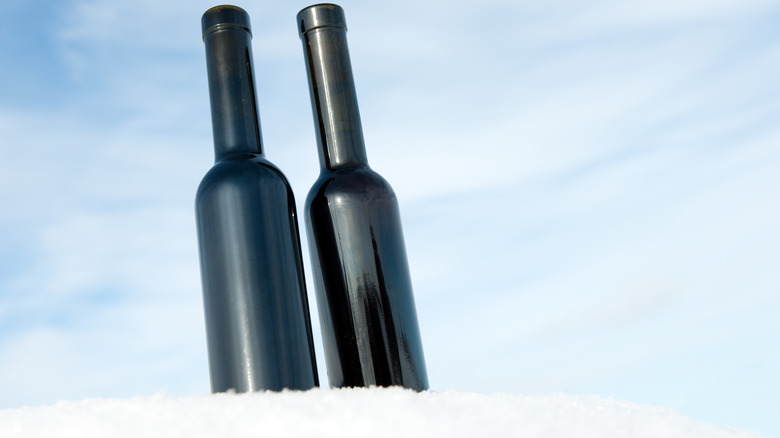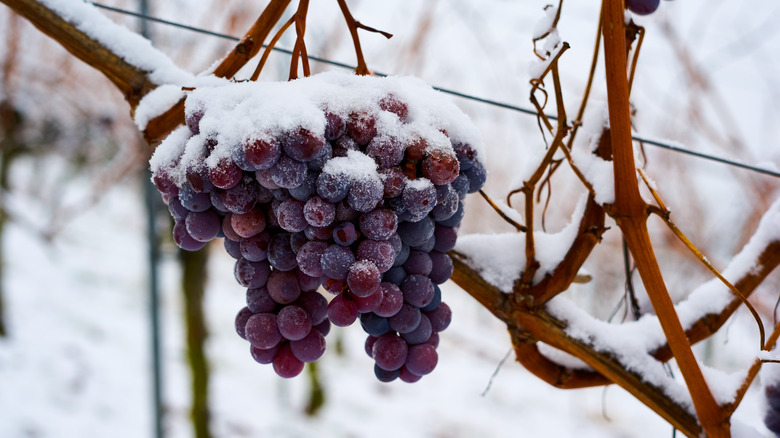It Turns Out Ice Wine Was Invented Completely By Accident
To err is human, occasionally even genius, and the culinary world in particular is full of happy accidents. Some of the greatest foods and beverages on Earth were invented by mistake, from beer to chimichangas. One seemingly ill stroke of fate even ended up turning the last places you'd expect into one of the world's most prized wine producers. When you think of wine, your mind might travel to France, where the regions of Bordeaux, Burgundy, and Champagne have lent their names to some of the most famous libations around. You might even think of the United States, where prosperous West Coast vineyards, particularly in California's Napa Valley and Oregon's Willamette Valley have become world-renowned. But would you ever guess that the countries with the most expensive wine exports on average would come from the oft-frozen lands of Switzerland and Canada?
You probably wouldn't expect to hear the world's elite sommeliers singing the praises of Ontario, but insiders know that the Great White North is a hub for one of the rarest and most treasured alcoholic beverages on the planet: ice wine. This ultra-sweet drink is expensive, with the low end of the price range being around $50 per bottle. On the other end of the spectrum, you have a bottle of Canadian ice wine that in 2006 sold for a jaw-dropping $30,000. Unimaginable quantities of money have changed hands for ice wine, and every penny earned is owed to a total accident — namely, a surprise cold weather snap.
What is ice wine anyways?
Ice wine is rare enough that you may not have heard of it. To tell the story of its accidental origin, you need to know why it's special in the first place. Ice wine, often written as one word ('icewine') in Canada, and known as 'eiswein' in its native land of Germany, is wine pressed from frozen grapes.
The flavor of grape juice comes from the various sugars, acids, and aromatic compounds it contains, but a majority of the juice (roughly 70-80%) is plain old water. When grapes are left on the vine in the winter snow, that water freezes and the flavorful compounds separate. Thus, when the grapes are finally juiced, the water content is far lower than usual, resulting in juice that is more like extremely concentrated grape syrup. After the mixture is fermented for a few months, you're left with one of the sweetest and most flavorful wines in existence. The results are rather magical, and it's all thanks to the ingenuity of German vintners, who adapted to sudden harsh conditions.
Ice wine is quite challenging to make. The grapes must be picked when the thermometer drops under 18 degrees Fahrenheit. Being so dependent on the whims of the weather, the quality of each harvest is largely out of the winemakers' hands. Complicating matters further are the challenges of processing frozen grapes. Sometimes they become so hard they break the juice presses! You can see where the lofty price tags come from.
Thank inclement weather for ice wine
Our inability to control the weather is the biggest challenge in making ice wine, but the stuff wouldn't even exist if it weren't for the climate's unpredictable nature. Ice wine originally comes from Germany's noted wine-producing region of Rheingau. Sources disagree on the year it was invented, but in either 1794 or 1830, the region was caught off guard by an early winter frost. Local winemakers were devastated, as the grape crops they had toiled on for months were frozen in an instant. Not wanting to waste their efforts, the vintners went ahead and pressed the frozen fruit. What other choice did they have? Of course, a scenario that at first seemed to spell disaster turned out to be a blessing in disguise, and we can only imagine the joyous surprise those German vintners felt when they tasted the results of their experiment.
Some dispute whether this event actually counts as the invention of ice wine since there are reports of Ancient Romans making wine from frozen grapes. However, it does not appear that Roman ice wine ever became a formally-recognized and intentionally-produced product as it did in 1800s Germany. From Rheingau, ice wine caught on worldwide, with cold regions around the globe seizing the technique, including many you wouldn't think of as wine hubs. In the United States, Michigan is a prominent producer of ice wine, and just a jog north of there, Canada reigns supreme as the world's largest ice wine producer.


